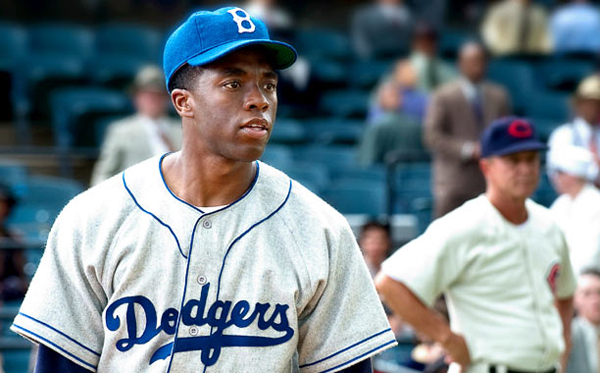The greatest stories are too great for Hollywood. Faced with inspiring true-life tales, movies often struggle to capture the reality and fall back on cranking up the string section. There's no greater sports story than Jackie Robinson, the first black player in major league baseball. 42, the new Robinson biopic from director Brian Helgeland, provides us with a story of opportunity, including the opportunity of a solid payday for orchestral musicians of every variety.
42 is not the first movie to tell the Jackie Robinson story. That would be The Jackie Robinson Story, starring Robinson himself, released in 1950 at the height of his career and just a few seasons after the events in question. This time around Robinson is played Chadwick Boseman, a relative unknown with some TV credits on his resume. Robinson's wife Rachel, aka "Ray," is played by Nicole Beharie, another TV stalwart. Throw in Chistopher Meloni from Law and Order: SVU as manager Leo Durocher and 42 threatens to take on a distinct TV movie feel. Hence the appearance of legitimate marquee content courtesy of Harrison Ford, hamming it up as Brooklyn Dodgers president and general manager Branch Rickey. Ford's growling, cigar-chomping performance may provide a frightening glimpse into the future of Han Solo in the forthcoming Star Wars VII.
It's not just the cast that shouts TV. Helgeland, who also wrote the script, gives us a Jackie and Ray Robinson who've stepped right out of a Hallmark romance. They're so sweet you'll want to pour them over pancakes. After Jackie signs his major league contract we see the couple at home, gazing out the bedroom window. "I love you," she says.
"I love you," he replies. End of scene.
Now that's writing. Later, while smooching, Ray gives her famous husband some batting advice: "Don't lunge at the ball." In reality Robinson got this advice from Dodgers batting coach George Sisler, but Sisler was probably not such a good kisser.
Courage under racist fire
42 does contain powerful moments -- the Robinson story offers a wealth. An exhibition game ended when a snarling, baton-toting lawman descends from the stands to shut it down; and Philadelphia Phillies manager Ben Chapman (Alan Tudyk) coming out of the dugout to pour out a stream of vile racial epithets during Robinson's at-bats. Not a yahoo in the stands, but a major league manager. And the movie constructs a scene with a father and son in the stands discussing the great shortstop Pee Wee Reese -- until Robinson takes the field and the father starts screaming racial abuse. After a few startled moments, the son joins in. Robinson's arrival in the big leagues was all about teachable moments.
One of 42's small pleasures is John C. McGinley as Dodgers radio announcer Red Barber, whose dry wit must have made those broadcasts a rare treat. Not mentioned though is Barber's own admission that after hearing about Robinson's signing he told Rickey he wasn't sure he could stay on the job. The player's courage and fortitude under torrents of abuse eventually made Barber a fervent supporter.
Biopics usually sand the edges off their subjects' biographies, to make for easier storytelling or just to shape the narrative. 42 reduces Leo Durocher to a much less complicated figure. His 1947 suspension from baseball is presented here as the result of an extra-marital affair. In fact the suspension was a story in itself, prompted by a combination of gambling, mob connections, the affair, and a nasty feud with Yankees' general manager Leo McPhail. But such subplots might distract from the inspirational focus. Also absent from the movie: Larry Doby, who integrated the American League only 11 weeks after Robinson broke the National League barrier. I guess by that time everybody was cool with it.
One odd detail change: the Dodgers' 1947 spring training schedule is depicted here as having taken place in Panama City. Actually it took place in Havana. Did this movie about bravery in defying public prejudice actually shy away from a historical fact that might upset the lunatic anti-Castro crowd? Say it ain't so, Brian.
Stories like Robinson's are always important. The recent kerfuffle over country singer Brad Paisley's song "Accidental Racist" is just another small reminder that racial issues are by no means history, even with a political Jackie Robinson in the White House. So 42 has a great tale to tell. That just doesn't make it a great movie. ![]()
Read more: Film
















Tyee Commenting Guidelines
Comments that violate guidelines risk being deleted, and violations may result in a temporary or permanent user ban. Maintain the spirit of good conversation to stay in the discussion.
*Please note The Tyee is not a forum for spreading misinformation about COVID-19, denying its existence or minimizing its risk to public health.
Do:
Do not: